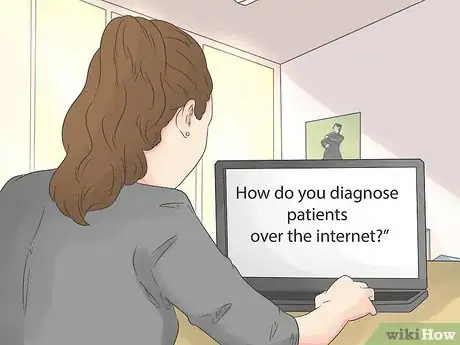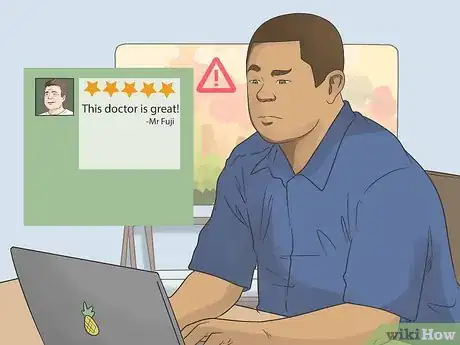This article was medically reviewed by Shari Forschen, NP, MA. Shari Forschen is a Registered Nurse at Sanford Health in North Dakota. Shari has worked in healthcare since 1996 and her expertise lies in acute care bedside nursing on a medical oncology floor. She received her degree from Medcenter one College of Nursing in 2003 and her Family Nurse Practitioner Masters from the University of North Dakota in 2014. Shari is a member of the American Nurses Association.
There are 12 references cited in this article, which can be found at the bottom of the page.
This article has been viewed 32,434 times.
Receiving diagnoses, medical advice, and prescriptions through online doctors is an increasingly popular option for patients seeking the convenience of an internet service; however, there are risks involved with online medicine. Not all doctors are reputable or scrupulous and illegitimate services are prevalent. By doing your researching and knowing what to look for, you can find the right online doctor for you.
Steps
Searching for your Doctor
-
1Search the internet. Use your preferred search engine and search for terms like “online doctor,” “telemedicine,” or “internet diagnosis.” You should also include your condition or the prescription you’re looking for with the word “and” between them.
- There are paid services that will help you find an online doctor like healthtap.com, livehealthonline.com, and virtualdoctors.org.
-
2Understand telemedicine jargon. The telemedicine industry includes a wide range of unique terms you may not be familiar with. Make sure you use your preferred search engine to research any terms you aren’t familiar with.
- The California Telemedicine & eHealth Center offers an extensive telemedicine glossary you may find helpful.[1]
Advertisement -
3Determine if it’s a subscription service. Some online doctor services only require a one-time fee for a consultation while others require or offer a long-term subscription. Make sure you read the terms of service closely and look for terms like “monthly charge” or “annual charge.” You can also contact the doctor or company’s customer service department to ask them directly.
-
4Determining insurance coverage. Many online doctor consultations won’t be covered by standard health insurance policies. Make sure to contact your insurance provider if you consider the consultation a medical necessity rather than elective.
- Some newer insurance policies will actually incentivize or require telemedicine diagnosis for minor conditions as a way of saving money.[2] Again, make sure to discuss these options thoroughly with your provider.
Researching your Doctor
-
1Check their credentials. Doctors require board certifications that are managed by the government. Many illegitimate medical professionals will pose as credentialed doctors or will practice a form of medicine that is outside of their credentialed area, so make sure you check for yourself.
- The website www.certificationmatters.org is an easy to use, independent resource for checking a doctor’s credentials. Just type in basic information like the doctor’s name and the address of their practice.
- Alternatively, see if the website for the online doctor lists a phone number. If so, call and ask if they can fax or email you a copy of their credentials.
-
2Understand local laws. While online and telemedicine laws are becoming more relaxed, not every U.S. state allows doctors to prescribe medicine online and some limit the types of prescriptions you can receive.[3] Use the internet to research the laws in your area.
- Keep in mind that the laws are applied based on the state you live in. In other words, you can’t skirt your state laws by speaking with an online doctor in a different state.
-
3Read patient reviews. There are many free online resources you can use to review doctors. Make sure to choose multiple sources and read as many reviews as possible to get a large sample.
- Web resources like WebMD, ZocDocs, Yelp, Google Reviews and Angie’s List offer patient-written reviews. Because you yourself are a patient and lack expert medical knowledge, it’s a good idea to learn what others have experienced in similar situations.[4]
-
4Use independent sources. While patient reviews are very helpful, you should also consult professional, independent review sources that can confirm the veracity of the doctor’s practice. As with patient reviews, the more sources you read the better.
- Sources like Healthgrades, BetterDoctor and RateMDs will offer verified reviews as well as more specific information you can’t find in patient reviews such as pricing information and statistics on medical outcomes.[5]
- There are some criticisms of review sites to be aware of. Some are paid by medical organizations or specific doctors that could compromise their objectivity. Some are compromised by fake reviews written by the doctors themselves.[6] Do your research on the site as well as the doctor. Reviews are legally required to disclose business relationships with the organizations they review so look for the words “Sponsored by.”
-
5Ask a lot of questions. Doctors are used to patients asking a lot of questions so don’t feel any need to hold back. Telemedicine practices or internet doctors often have special hotlines or chatrooms/forums set up for this purpose.
- Consider asking something like “How do you diagnose patients over the internet?”
Avoiding Scams and Quacks
-
1Be skeptical of alternative medicine. Alternative medicine is a broad term that can apply to many different therapeutic approaches, some of which are legitimate. However, the term is also broadly used to cover forms of medicine that haven’t been scientifically proven or have questionable science behind them. Because alternative medicine practitioners are not always sanctioned, they often flourish on the unregulated space of the internet.[7]
- Therapeutic solutions that are based solely on nutritional choice or herbal remedies are likely not approved by the U.S. Food and Drug Administration (FDA) for treating serious medical conditions.[8]
- You don’t necessarily have to dismiss alternative medicine options out of hand. Some do have proven medical value or, at least, very little risk. Independent research is the key.[9]
-
2Beware of pseudoscientific jargon. Look out for terms like “detoxify,” “nerve energy,” “bring your body in harmony with nature,” or “balance your body’s chemistry.” These terms are often used to skirt laws governing legitimate medicine because they have no actual meaning in the medical world.[10]
-
3Be skeptical of anecdotes and testimonials. As mentioned above, patient reviews can be valuable for learning about doctors but are less so concerning the actual therapeutic methods. Many single episodes of a disease recover for a variety of reasons that may have little or nothing to do with the treatment offered.[11] Ultimately, patients are not experts and may not know enough to give sufficient advice so take testimonials with a grain of salt.
-
4Beware of paranoid claims. Many unconventional practitioners will claim that the medical profession as a whole, drug companies and the government are conspiring to suppress whatever methods they are espousing. This is a definite red flag of quackery.[12]
References
- ↑ https://www.caltrc.org/wp-content/uploads/2021/01/ATA-Children-Adolescents-Guidelines-1.pdf
- ↑ http://www.modernhealthcare.com/article/20160220/MAGAZINE/302209980
- ↑ https://amwell.com/cm/blog/can-i-get-a-prescription-from-an-online-doctor/
- ↑ http://www.consumerreports.org/cro/2014/09/how-to-choose-a-doctor/index.htm
- ↑ http://medcitynews.com/2012/08/heres-a-look-at-some-of-the-criteria-5-websites-with-doctor-ratings-use/
- ↑ https://www.washingtonpost.com/business/2021/06/04/fake-medical-reviews-google-zocdoc-trustpilot/
- ↑ https://www.betterhealth.vic.gov.au/health/conditionsandtreatments/complementary-medicines-the-risks-of-buying-online
- ↑ http://www.webmd.com/a-to-z-guides/experimental-treatments#1
- ↑ http://www.ncbi.nlm.nih.gov/pubmed/21104324









































































Medical Disclaimer
The content of this article is not intended to be a substitute for professional medical advice, examination, diagnosis, or treatment. You should always contact your doctor or other qualified healthcare professional before starting, changing, or stopping any kind of health treatment.
Read More...